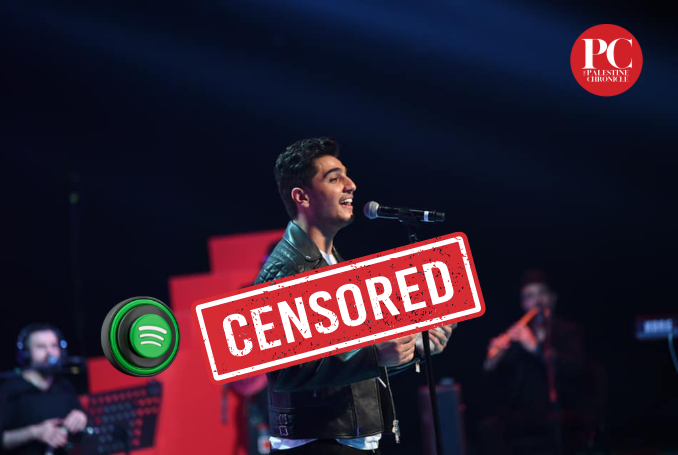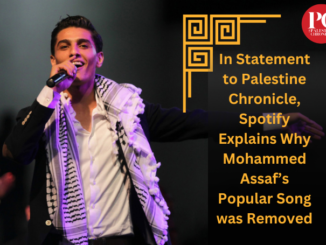
By David Miller & Paul Salvatori
Several lobby groups in the UK with strong links to the British government first pressured music giant Spotify and then imposed key changes on the company’s organizational structure.
Music streaming giant Spotify has been pressured by two prominent British Zionist groups We Believe in Israel and the Board of Deputies of British Jews. The former is a project of the pre-eminent public relations group for Israel, the Britain Israel Communications and Research Centre (BICOM), which is run by former arms lobbyist Luke Akehurst. The Board of Deputies badges itself as the representative body of British Jews. But as it makes clear in official filings, it collaborates closely with the Israeli government, including with the IDF Spokespersons Office.
These Zionist lobby groups have successfully pressured Spotify to delete pro-resistance Palestinian music. To do so, the UK lobby groups We Believe in Israel and the Board of Deputies have enlisted the help of the British government.
It first became apparent that the lobby was targeting the platform when We Believe in Israel, a project of the UK’s preeminent public relations body for Israel, announced that it was demanding the removal of British-Iraqi hip-hop artist Lowkey from the streaming service in March 2022.
While the attempt against Lowkey failed due to significant public backlash and celebrity support, the lobby groups escalated their campaign and succeeded in removing the work of Palestinian artists Shadi al-Bourini and Qassem al-Najjar. We Believe in Israel, which is led by former arms industry lobbyist Luke Akehurst, boasted of the achievement in a press release with the Board of Deputies, in which the organizations admitted they had lobbied a British Minister on the issue.
The release failed to mention that Lucy Frazer, who is the Minister for Culture, had been an intern at the Israeli Ministry of Justice before being appointed to the British government. A current Senior Policy Adviser to Frazer is Adam Zinkin, who was previously a Security Analyst at the Israeli government-linked Jerusalem Centre for Public Affairs. Following the removal of these Palestinian artists, seemingly with help from a British minister, Akehurst made clear that Lowkey was still in his sights: “Now we need them to look at why they are hosting explicitly antisemitic and conspiratorial songs by Lowkey”.
Akehurst has previously been a consultant for arms firm Finmeccanica, also known as Leonardo. The company has billions of pounds worth of deals with the Israeli Military. We Believe In Israel has also acknowledged working with a “range of stakeholders, including the Israeli embassy”.
The parent organization of Akehurst’s lobby group is BICOM (the Britain Israel Communications and Research Centre), which has coordinated with the Israeli Embassy on anti-BDS campaigns in the UK. Its leader Richard Pater is also a current reserve in the Israeli army and former employee of the Israeli Prime Minister’s Office.
The campaign manager at We Believe in Israel, at the time of the drive against Lowkey, was Rachel Blain. Today, she is the Director of Public Affairs at the Conservative Friends of Israel. Blain had previously been a public affairs intern at the Board of Deputies. She notes on her LinkedIn page that she previously worked as a press assistant at an unnamed “International Embassy” in London, where she “researched various media groups and platforms”. Prior to that Blain had worked for the Zionist Federation, where she “created dossiers to counter anti-Israel campaigns”. Considering her record, it is likely that Blain worked as a press assistant at the Israeli embassy.
Spotify’s infiltration by pro-Israel forces is multipronged. Since the failed campaign against Lowkey, there have been several key changes at the company. The recently appointed Senior Counsel in Legal and Business Affairs is Andrew Joseph, previously a Sergeant in the Nahal Infantry Brigade of the Israeli military.
Spotify also established a Safety Advisory Council to regulate content. This includes an organization that is chaired by a former director of BICOM which, as we have seen, is lobbying Spotify to remove pro-Palestinian content via We Believe In Israel. The Institute for Strategic Dialogue (ISD), also on the Council, was founded by the late Israel lobbyist George Weidenfeld, a former political advisor and chef de cabinet for Chaim Weizmann, the first President of Israel. Today, the ISD is headed by former BICOM director Michael Lewis.
The Spotify Council also features Meghan Phelps Roger, formerly of the Westboro Baptist Church. She claims she was cured of antisemitism by Israeli David Abitbol, who is sponsored by the Israeli Ministry of Tourism.
Ronaldo Lemos is also on the Spotify Council, and at the same time, on the Facebook Oversight Board, which includes Emi Palmor (founder of the Israeli Cyber Unit and formerly of Unit 8200).
The Spotify safety council also includes Swedish academic Christer Mattsson, who works with Yad Vashem, the Holocaust Museum & Center for Tolerance and Education, which is funded and controlled by the Israeli regime.
Spotify has also now directly partnered with an Israeli company called Riverside for a new video streaming mechanism. That company is staffed with numerous Israeli government, military or intelligence veterans, such as Ofir Brenner.
The Israeli lobby’s frequent complainant that pro-Palestinian music is “antisemitic”, including it being an “incitement” to violence against Jewish people, and which it primarily cites as reason to censor the music has no legitimacy. In reality, the pro-Palestinian music the lobby attacks, such as the remarkable likes of vocalists Lowkey, Ambassador MC and Mohammed Assaf, expresses no hatred at all.
This should be no surprise to those familiar with the artists. Listening to them one hears that they are commenting on many issues – from Palestinian solidarity and the Boycott, Divestment, Sanctions (BDS) movement to resisting the criminal harm Israel does to Palestinians and Zionist erasure of Palestinian life.
Such issues are indeed pro-Palestinian in that they are grounded in respect for the dignity of Palestinians – as human beings. But that’s not bad. The fact that the lobby would like the world to think otherwise, as when the issues are addressed in pro-Palestinian music, is indeed problematic.
It suggests that support for the Palestinian people, let alone under illegal Israeli occupation, is something to be morally avoided. What could possibly justify such a preposterous claim? It’s beyond any doubt, given the countless testimonies of Palestinians themselves, comprehensive reports by the United Nations and other respected human rights bodies, decades of historical and other scholarship, etc. that Palestinians are being brutally oppressed. And the oppressor is Israel.
As fellow members of the international community – artists and non-artists alike – we are called to respond to this. And the right way of doing so is siding with the oppressed. Palestinians, much as they are survivors, are victims. Whether it’s depriving Palestinians of water or healthcare or raiding them almost nightly in the West Bank, Israel does not extend even basic respect to Palestinians.
Pro-Palestinian music can challenge audiences to not only think about this but what to do about it. This is apparent when Lowkey, in “Long Live Palestine”, raps about the harsh living conditions of Palestinians living in refugee camps, within the Occupied Territories:
Do not forget the people [Palestinians] of the camps
As you sleep and count the
Stars, think of others
Those who have nowhere to sleep
As you liberate yourself with
Metaphors, think of others
Those who have lost the right to speak
As you think of others far away
Think of yourself and say ‘if only I
Were a candle in the night’
Energized by the emotional impact or force of music, such lyrics have the potential to mobilize people. This is arguably one of the main reasons that the Israeli lobby wants to censor pro-Palestinian music. Israel doesn’t care so much about what people think about it, illustrated by the shameless anti-Palestinian racism of its current government, as it does how people may act towards it.
The lobby does not limit itself to public relations. It’s committed to demobilizing pro-Palestinian initiatives, ultimately aimed towards justice for Palestine.
In a reply to a letter, informing him that a library had censored one of his books, well-known American literary critic Charles Bukowski observes: “Censorship is the tool of those who have the need to hide actualities from themselves and from others.” Though Bukowski wrote this originally for a private audience, it applies to the Israeli lobby as well.
In attempting to censor pro-Palestinian music, it seeks to suppress awareness of those “actualities” that implicate Israel and for which it still needs to be held fully accountable, dispossessing them of their land and homes, destroying their agriculture, imprisoning them without proper legal recourse or protections, killing them when they pose absolutely no threat (Palestinian journalist, Shireen Abu Akleh, quickly comes to mind).
Pro-Palestinian music defies such suppression. It insists that, however uncomfortable it may sometimes make us, we consider what Palestinians are forced to endure. That may naturally cause us to feel moral indignation at Israel but that is far from anti-Semitic.
It means that we, true to our common humanity, are upset by injustice not only when it happens to us but to others too. Like artists who create pro-Palestinian music, we can channel that, whatever our talents, into ending such injustice for good.
– David Miller is a non-resident Senior Research Fellow at the Centre for Islam and Global Affairs at Istanbul Zaim University and a former Professor of Political Sociology at the University of Bristol.
– Paul Salvatori is a senior producer at TRT World.
This article was originally published in TRT and was contributed by the authors to The Palestine Chronicle.







